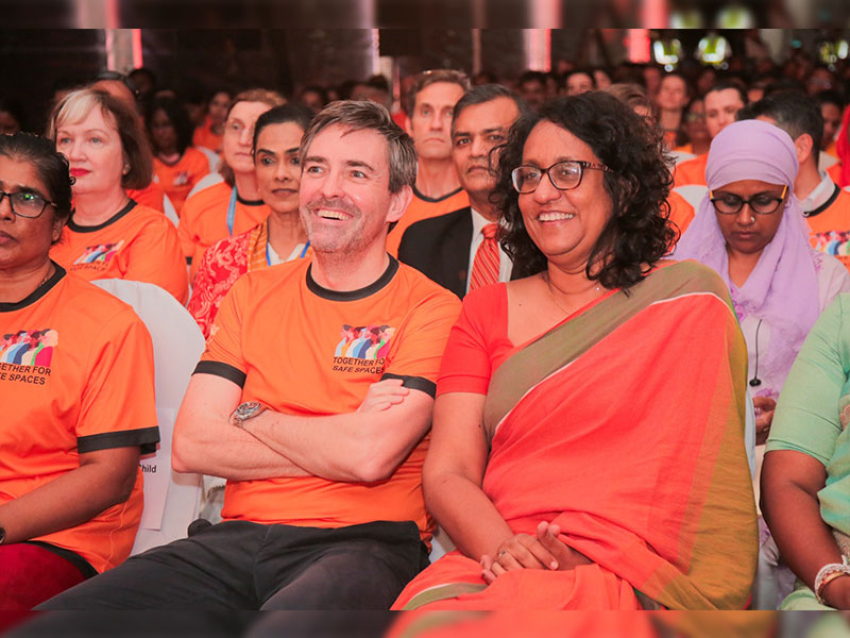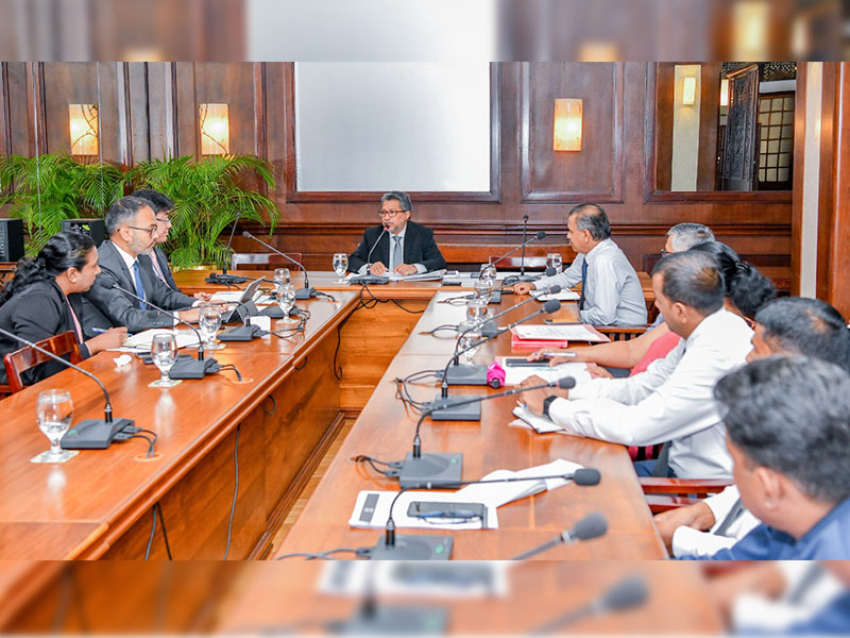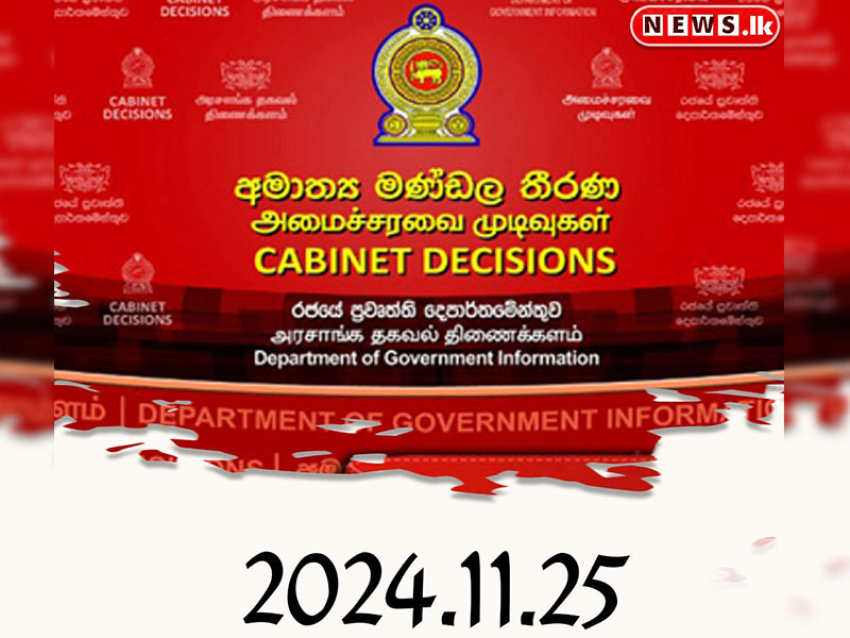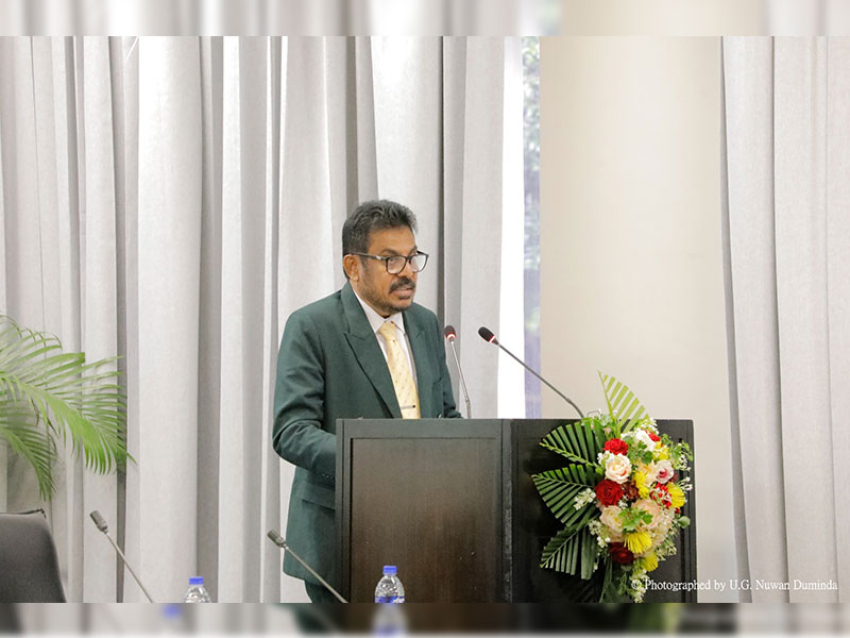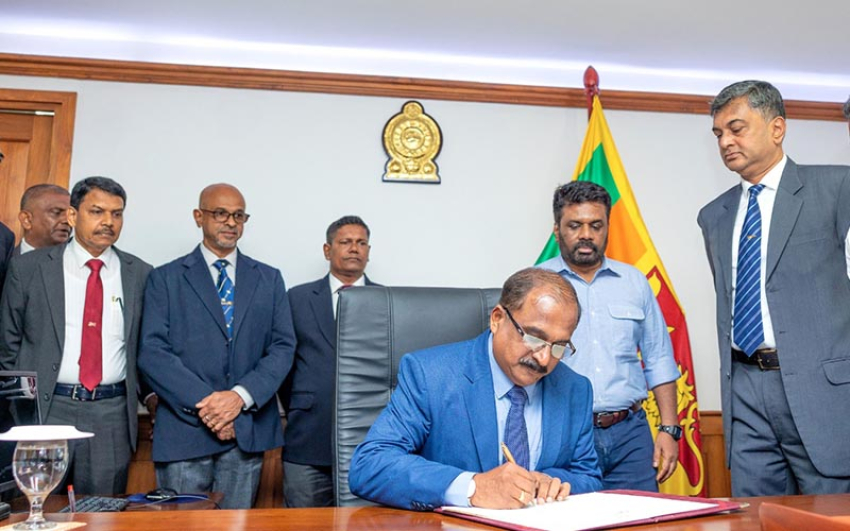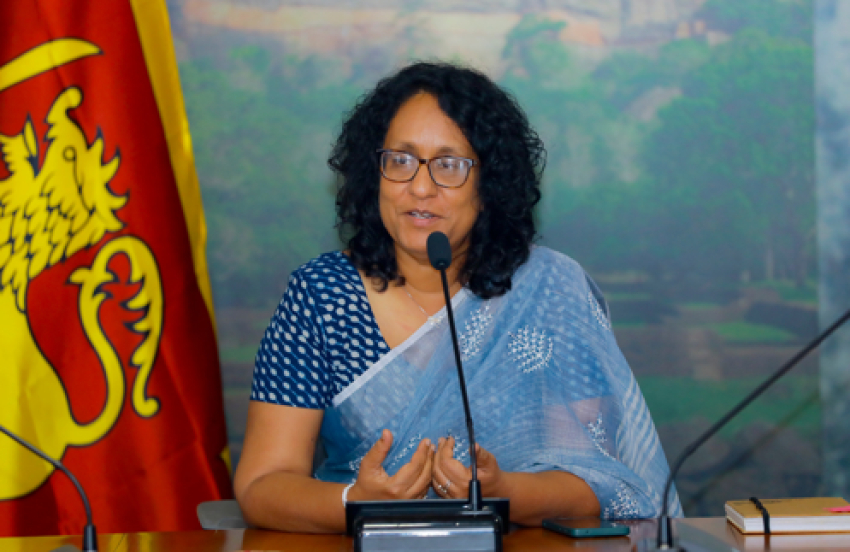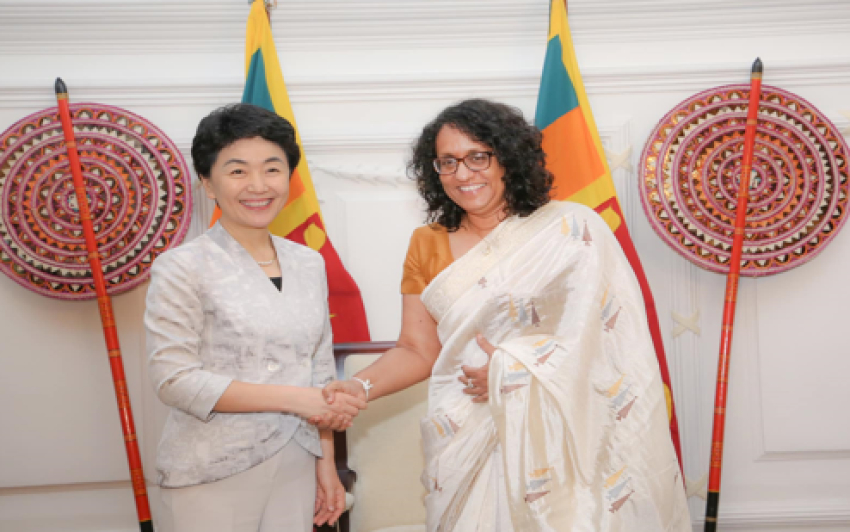Joining the debate on the President’s Policy Statement, the state minister said, “Prior to nominations, they brought up his citizenship issue. When it was proven that there was no issue, it died down, but just a few days prior to the election, the then government tried to mislead the people by bringing up the citizenship issue again.”
“However, despite all these factors, people had three reasons when electing a new leader. The first is the country’s security and safety, next is the country’s discipline, and third is the country’s economy. The public had great concerns regarding the security of this country. On May 19, 2009, after the 30-year war was over, for the next 10 years, people had no fear regarding the security of the country. However, after the April 21 attacks in 2019, the public had great concerns regarding it once again,” the state minister said.
“People began to feel insecure as they did prior to 2009. Therefore, they wanted a leader who could ensure the safety and security of this country. That is why the nation chose Gotabaya Rajapaksa as the new President,” he added.
He said that despite efforts by the then government to mislead people and stir up racial discord, the majority of the country made a firm decision and voted for Gotabaya Rajapaksa. State Minister Abeywardena noted that the President had certified the security of this country and had brought the military, intelligence units, and police under one ministry to ensure the proper functioning of the state security apparatus.
He pointed out that between 2018 to 2019, there had been 2,789 protests staged over various issues. “If an investor saw that, they would never want to invest in this country. Therefore, there must be proper discipline in this country. The public voted for President Gotabaya Rajapaksa because they wanted discipline to be established.”
Abeywardena also noted that the country’s economy had suffered due to the absence of the above two factors (security and discipline). This policy manifesto is designed for a period of five years and it will be implemented in stages during the specified period.
Explaining the exemption of VAT, he said only a small segment of society was paying this tax, and that by simplifying the taxes and getting a larger segment to pay taxes, this amount lost through VAT could be easily recovered.
He said that the previous government could not find an investor for the land adjoining the Shangri-La Hotel since 2017, but within a week of being appointed as President, Gotabaya Rajapaksa had found an investor to lease this land for 99 years and construct residences and shopping malls.
“This land is three acres, three perches, and three roots. We have got an investor for $250 million (Rs.78 billion). Although Rs.1.8 billion was paid as initial payment, we are yet to sign the agreement, and have notified the company to pay the balance by the end of January. This land is not sold, but leased,” the state minister said.
He said, “Moreover, the government will charge a tax of Rs.450,000 monthly in addition to the Rs.708 billion. The investor has notified the government that the balance Rs.60 billion would be paid prior to March, before the construction begins.”
“This project will have 700 houses, as well as other shopping malls and amenities. The government also has the right to change the rent and other payments during this period, which is also included in the agreement,” he added.
State Minister Abeywardena said that during the previous regime, the executive, judiciary, and legislature were all destroyed.
“At present, we have restored the dignity of all 225 MPs in Parliament and are in the process of restoring the dignity of the judiciary as well,” he said.
Aluthgamage queries where Sajith
was when MCC agreement was signed
Power State Minister Mahindananda Aluthgamage queried as to where Opposition Leader Sajith Premadasa was when the former government imprisoned war heroes, harassed Buddhist monks, attempted to sign the Millennium Challenge Corporation (MCC) Agreement, when he opposes them today.
State Minister Aluthgamage said that today, Sajith Premadasa speaks against the former government’s decisions, though he was a Cabinet minister when the same government took those decisions.
He made these observations joining the adjournment motion moved by the Opposition on the Policy Statement presented by President Gotabaya Rajapaksa in Parliament on January 3.
While congratulating Premadasa for his maiden speech as the Opposition Leader, State Minister said that, still, the Opposition has to find their true leader. He said that though some Opposition members support Sajith Premadasa, the rest support another. “The Opposition has been such a failure that it has still been unable to find one proper leader,” Aluthgamage said. At this stage, Speaker Karu Jayasuriya said that an Opposition Leader has duly been appointed. State Minister Aluthgamage said that although Premadasa suggested to tear the MCC agreement, there is no such agreement. The government would not sign such an agreement. He added that the government would provide fertiliser to the farmers, too.
“The prices of vegetables would be reduced soon. We would create more employment opportunities and keep all our pledges. The former government forgot to provide jobs for five years, but they granted employment to UNPers during their final two months in power, which the Election Commission said was illegal,” he said.
Highlighting that the Opposition had claimed that their MPs are being hunted down by the current government, Aluthgamage said, “Patali and Ranjan have been granted bail; but, under the same law, Wimal, Namal, Johnston, and Basil were arrested. The way in which the judiciary acted back then is not like how it is acting right now under our government. This proves that the judiciary is independent today.”
He added that there should not be four Opposition Leaders in the House; only one should be elected.
Lanza demands investigation into Ranjan’s illegal ammunition possession
Community Development State Minister Nimal Lanza demanded to investigate as to how MP Ranjan Ramanayake had 150 illegal bullets in his possession.
State Minister Lanza said that, under the permission of the Parliamentary Secretary-General, Parliamentarians are allowed to use a firearm. He added that if it is a pistol, an MP can keep 10 bullets in his possession and, if it is a revolver, the MP can keep nine bullets. State Minister Lanza pointed out that however, MP Ramanayake possessed 150 bullets in his possession, which is a breach of the law.
He queried if the Parliamentary Secretary-General had given him special permission to keep such an amount of bullets while they were permitted only a few.
On this occasion, Speaker Karu Jayasuriya said that the Secretary-General had no involvement in the illegal activities.
Previous government abused the Judiciary: Namal
Highlighting that the previous government was intent on targetting their opponents, United People’s Freedom Alliance (UPFA) MP Namal Rajapaksa said that former MP Duminda Silva, who was convicted for the murder of former Minister Bharatha Lakshman Premachandra, was given the death sentence in an unfair manner.
Participating in the adjournment debate on President Gotabaya Rajapaksa’s Policy Statement in Parliament, yesterday, Rajapaksa said, “From the leaked telephone conversations between Ranjan Ramanayake and judges and CID officers, it is crystal clear that Duminda Silva was framed. Because of the behaviour of former government ministers such as Ranjan Ramanayake, people have lost their faith in the Judiciary.”
He said all that the previous government did over their four years was hunting down their opponents: “Ramanayake’s phone calls are a perfect examples of this. We will not do the same. We do not have any desire to target or take revenge from our political opponents,” he added.
Careful discussions necessary for Govt. Policy Statement: Sumanthiran
‘Signals important paradigm shift from general direction of successive governments’
The Government Policy Statement, as laid out by President Gotabaya Rajapaksa on January 3, is one that needs to be carefully discussed as it signals an important paradigm shift from the general direction successive governments have pursued in the past 30 years, Tamil National Alliance (TNA) MP M.A. Sumanthiran said at the debate on the President’s Policy Statement.
“November 16, 2019, gave the President a decisive victory. But what is troubling about this big victory is that no community other than the majority Sinhala Buddhists were prepared to repose any confidence in him. I am not saying this to cast any aspersions on the President himself, but only in order to flag a very important factor that we cannot ignore if we are serious about national reconciliation and moving forward as a country,” the parliamentarian said.
“The test of popularity of a leader of a country is not whether his own people have confidence in him, but whether the other people are prepared to place their trust in him. Sadly, this was found wanting. The President himself showed that he is conscious of this fact in the two comments he made after his victory,” he added.
MP Sumanthiran said that President Rajapaksa had spelt this out at his oath-taking ceremony at the Ruwanwelisaya when he acknowledged this fact, but very correctly added that he is the President for the whole country—even of those who did not vote for him.
The parliamentarian said, “We expected the President to take steps to breach this gap by recognising that our country is rich in diversity with people of different races, religions, languages, and cultures. The equal status of each of these people is not dependent on their respective numerical strength. This principle must be acknowledged if our democracy is to survive and, indeed, flourish—and not regress into naked majoritarianism.”
“Regretfully, in his address to Parliament on January 3, the President has articulated such a regressive position. It was this kind of regressive mindset on the part of the leaders of this country that gave rise to a conflict which resulted in armed hostilities that raged for more than three decades,” he added .
“Our party, the Illankai Tamil Arasu Kachchi (ITAK), better known as the Federal Party in the early years, was born as a result of the passage of the Citizenship Act and in the Indian-Pakistani Citizenship Act, which disenfranchised nearly 800,000 people who had seven Members in the first Parliament,” Sumanthiran said.
“This was said to be the will of the majority, which took away the most basic rights of a citizen—in fact, their citizenship itself. The people of this country must understand that the necessity for a political party based on race, the Illankai Tamil Arasu Kachchi, was this rank majoritarian act by the first Parliament of Independent Ceylon,” he added.
“In 1956, we saw further manifestation of majoritarianism in this country when the Official Languages Act recognised Sinhala as the only official language. Violence against the Tamils of this country was used when our leaders protested through a peaceful satyagraha campaign at Galle Face Green, which later expanded to periodic pogroms,” the MP said.
When the first Republican Constitution was being drafted, our party sought to correct the injustice relating to language.
J.A.L Cooray; in his treatise, ‘Constitutional and Administrative Law of Sri Lanka (Ceylon)’, at page 81, says: “On June 28, 1971, the Constituent Assembly adopted by 88 votes to none (10 declining to vote); the Basic Resolution regarding the language of legislation, namely that ‘All laws shall be enacted in Sinhala and that there shall be a Tamil translation of every law so enacted’.
“The amendment proposed by the Federal Party that ‘Sinhala and Tamil should be (a) the languages in which laws shall be enacted, (b) Official Languages of Sri Lanka, (c) the languages of the Courts, and (d) the languages in which all laws be published’ was rejected by 88 votes to 13.
“After the debate and division on the Amendment, S.J.V. Chelvanayakam, the [then] Federal Party leader, made a statement in the Assembly. He said that, as the language rights of the Tamil speaking People were not satisfactorily provided for in the proposed Constitution, no useful purpose would be served by their ‘continuing in the deliberations of this Assembly’. He went on to say that after the adjournment on that day, they would not come back to the Assembly”.
He noted that his party’s efforts were in vain, and that a majoritarian Constitution was enacted in 1972. This was repeated in 1978 when the Second Republican Constitution was enacted. It was only after the events of Black July in 1983, when scores of unarmed Tamil civilians were killed across the country, that India used its good offices, which was accepted by the Sri Lankan Government to turn the tide and begin to correct the injustices against the Tamils, he added.
In 1987, the country turned to the right direction and started acknowledging the diversity of its peoples by amending the Constitution. Provincial Councils were established so that the people who are numerically in the minority can exercise at least a measure of governance in the peripheries. Tamil was also made an official language, along with Sinhala, the MP said.
“These first steps enabled us to re-enter the national life from which we had, until then, been excluded. Successive governments thereafter took further steps in this direction in order to fully settle the ‘Tamil National Question’: The Mangala Moonesinghe Parliamentary Select Committee process under President Premadasa, the several proposals culminating in the Constitution Bill of August, 2000, under President Chandrika Bandaranaike Kumaratunga, and the All-Party Representative Committee (APRC) process under President Mahinda Rajapaksa,” MP Sumanthiran said.
“During the final battle with the Liberation Tigers of Tamil Eelam (LTTE), President Mahinda Rajapaksa’s government repeatedly assured India and the rest of the international community that the ‘Tamil National Question’ would be politically resolved after the war by means of greater devolution, ” the parliamentarian said.
“The assurance given to India on at least three occasions was to ‘implement the 13th Amendment in full and build upon it so as to achieve meaningful devolution’. Full implementation of the 13th Amendment also includes the full implementation of Tamil as an Official Language,” he added.
Sumanthiran pointed out that after the Sirisena-Wickremasinghe government took office in 2015, a Resolution was passed unanimously in the House on March 9, 2016, to convert the House into a Constitutional Assembly. A great amount of work has been done by the Steering Committee and the several sub-committees with the full participation of all the parties in Parliament, including the United People's Freedom Alliance (UPFA), the MP said.
“We have fully co-operated in this effort in order to finally settle this issue for the betterment of the country. Our people are still ready and willing to settle this question on the basis of a united, undivided, and indivisible country that recognises the diversity and equality of its different people. To this end, we welcome the President’s proposal that a new Constitution be enacted,” he said.
The past 30 years have seen the country making such positive efforts towards resolving issues that have plagued it since Independence by meaningfully acknowledging the plural nature of the country's polity, the MP said, adding that there is still some distance to go—and that is the direction the nation must continue in if the country is to prosper. Any deviation from that path would spell doom to the nation, he said.
“I have heard many people close to the present government talk about Singapore; how it prospered while achieving national harmony among its citizens. Singapore is a great example. If we do not pick and choose what we like to see, we would notice that it has four official languages. They even sing their National Anthem in Malay, who are 15 percent of their population,” the MP said.
He added that perhaps it is instructive to listen to what Lee Kuan Yew, the father of modern Singapore, said about Sri Lanka: “Ceylon was Britain’s model Commonwealth country. It had been carefully prepared for independence. After the war, it was a good middle-sized country with a population less than 10 million people… When Ceylon gained independence in 1948, it was the classic model of gradual evolution to independence.
“Alas, it did not work out. During my visits over the years, I watched a promising country go to waste. One-man-one-vote did not solve a basic problem. The majority of some eight million Sinhalese could always outvote the two million Tamils who had been disadvantaged by the switch from English to Sinhala as the official language. From having no official religion, the Sinhalese made Buddhism their national religion. As Hindus, the Tamils felt dispossessed”.
Bandarigoda urges government: stay
true to President’s Policy Statement
United National Party (UNP) Parliamentarian Bandula Lal Bandarigoda urged the government to keep the promises of the Policy Statement presented by President Gotabaya Rajapaksa in Parliament on January 3.
He said so yesterday, in Parliament, commencing the adjournment debate on the Policy Statement presented by President Rajapaksa in Parliament on January 3.
MP Bandarigoda said that there were many promises, including creating 100,000 jobs for youth, providing free fertiliser, ensuring media freedom, providing schoolchildren with stationery and other necessities, as well as increasing the allowance for cancer and kidney patients.
However, the government, aside from keeping those pledges, has commenced a hunt on Opposition MPs. He added that even Professor G.L. Peiris had told to media that all these pledges are impossible to keep.
‘Government did not suspend Opposition MPs’ Consolidated Fund privileges’
Development Banking and Loan Schemes State Minister Shehan Semasinghe said that the government has not suspended the releasing of money from the Consolidated Fund to the Opposition MPs for their political work in the respective electorates, as the Opposition MPs have alleged.
The Election Commission had stopped them before the election, he said, adding that several circulars had also been issued by the former Prime Minister with regard to the release of funds for the MPs from the Consolidated Fund. He further said that the release of funds based on the circulars has also commenced.
The state minister made these observations yesterday, in Parliament, in response to United National Party (UNP) MP S.M. Marikkar, who said the government was hindering the MPs’ political work by blocking the funds coming from the Consolidated Fund to the MPs to develop their respective electorates.
MP Marikkar said that the government has stropped releasing the money from the Consolidated Fund to the opposition MPs.
“Each MP is entitled to Rs.10 million from the Consolidated Fund, to spend on development projects in their electorates. That is a right of an MP. The new government, soon after coming to power, suspended all development projects that had been launched by the previous government,” he said.
“Under that suspension, they stopped the release of funds from the Consolidated Fund to the MPs, thus depriving us of our privileges. Now, there is an election coming and, after several more weeks, another election would be announced. Thereafter, the Election Commission would suspend all development projects in view of the election. This is unfair by the MPs,” the MP added.
State Minister Semasinghe said that there was no suspension of funds by the government.
“The election commission suspended the development projects because they could result in political misappropriation and effect elections.
“There had been several circulars issued by the former Prime Minister with regard to the release of funds for the MPs from the Consolidated Fund. Now, the release of funds on the basis of those circulars has commenced,” he said.
Fonseka questions practicality of President’s cost-cutting move
While appreciating the efforts of President Gotabaya Rajapaksa to reduce unnecessary costs, it is also pertinent that it is done practically, Filed Marshal MP Sarath Fonseka said.
Joining the debate on the President’s Policy Statement in Parliament, yesterday, he found fault with the President for cancelling the Presidential Guard of Honour assigned to the latter before delivering the Policy Statement in Parliament on January 3.
Participating in a debate on the President’s Policy Statement in Parliament, the Field Marshall said, “The cancelling of the Guard of Honour parade set a wrong precedent. Such actions should not have been done. Accommodating a Guard of Honour, including a 21-gun salute to a President coming to open Parliament sessions is a serious event which symbolises not only the dignity of the person who is accepting it, but also the dignity of the institution and the tri-forces who participate in it.”
“In giving a Presidential Guard of Honour, the officers and men come in their ceremonial uniform and bring their weapons of the highest grade. In the instance of January 3, troops had rehearsed it and were ready to enact the time-honoured act. At the last moment, the President cancelled it on his own accord. Before doing so, he should have thought twice of its repercussions. Cancelling a time-honoured event which had been there for a purpose was an ill-thought act.
The mere reason cited for the cancellation was to cut down expenses. I hope that the Kandy Dalada Perahera would not be cancelled one day on the same grounds,” the Field Marshal added. The MP also noted that while the President uses only three vehicles and is attempting to cut costs, it is futile if the rest of his ministers do not follow suit. On a lighter note, MP Fonseka said that this is why the President is often seen in a short-sleeved shirt and dressed very simply.
However, this is not a good precedent as it would be totally absurd if some other president or minister decides to come in shorts, he added.
He said that although they were labelled as pro-Western, he is glad the President wore a full suit.
Referring to the shawl worn by the Rajapaksas, the Field Marshal commended the President for educating the House on its history. He added that a very attractive component of the President’s policy is the reduction of taxes.
“However, it is questionable whether the benefits of these tax cuts is enjoyed by the people. At the end of the year, during the festive season, the price of essential commodities shot up greatly, inconveniencing the public. They reduced taxes, but cut several projects that were initiated by the previous government. We had planned to grant Samurdhi benefits to 600,000 people, but once the new government came to power, they discontinued it,” he said, adding that it is not fair as people are facing great hardships to survive.



